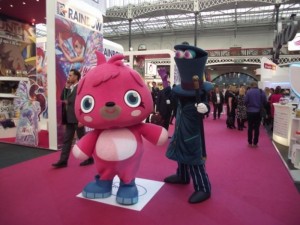Licensing and the amusement and gaming business have always had a symbiotic relationship and this was never more evident than at the Brand Licensing Europe show in London’s Olympia this week.


At first sight it resembled a children’s theme park, with costumed characters walking the aisles, including SpongeBob SquarePants, Ben 10, Moshi Monsters and the Haribo bear. However, there was nothing childish about the stands crammed with grown-ups in suits. For licensing – in particular children’s licensing – is big business.
There are various ways in which a licensed property becomes a brand. The most common is through a TV or film franchise and understandably these companies had the biggest stands at the show. Endemol had a stand crammed with visitors and a glance at the walls showed a veritable smorgasbord of quiz and reality TV show offerings, including the hit Deal or No Deal, which has spawned a dynasty of Bell-Fruit Games machines over the years and which has just been renewed.
A brochure revealed TV shows which are yet to hit our screens and which sound strangely implausible, but which will no doubt become household names.
And this is the fun of this fair, I am sure, as delegates check out not only the proven licences – like Postman Pat - but the characters that have not yet made it into the spotlight and which may or may not capture the public’s imagination. For these are the deals that can be made for a fraction of the price of a proven intellectual property.
We spoke to David Hopkins, business outreach and education manager at the Intellectual Property Office, about the best way to market for a manufacturer looking to acquire a licence for an amusement or gaming machine.
“I wouldn’t suggest going directly to the holder of the licence,” he said. “That would be like buying a house directly from the vendor. The best course would be to find a reputable intellectual property agent and to let them handle the negotiations.” It is not as simple as just acquiring the licence either. The manufacturer will have to agree with the licence holder a percentage of the cost price of each unit sold and therefore will have to agree how many will be produced. The holder of the licence will have a right to check that this number has been adhered to – even if this means going through a manufacturer’s books.
Beyond the glitz and glamour of the TV and film worlds there were other, more sedate and unusual licences to be found. Games such as Monopoly and Scrabble have become brands in their own right, with their images transposed onto mugs, greetings cards – and of course numerous amusement machines.
Sweets also have become iconic brands and are a stalwart of amusement arcades around the world. Chupa Chups lollipops created its own nostalgic sweetshop to highlight this fact. Haribo – which even has its own theme park – was also present with its famous bear.
On the outskirts of the show were rows of small companies and artists like X Factor hopefuls dreaming that their creations would be picked up by retailers or TV companies to become the next big thing. Well, why not? Even Spongebob had to start somewhere…
Click here to see images from the Brand Licensing Europe.

